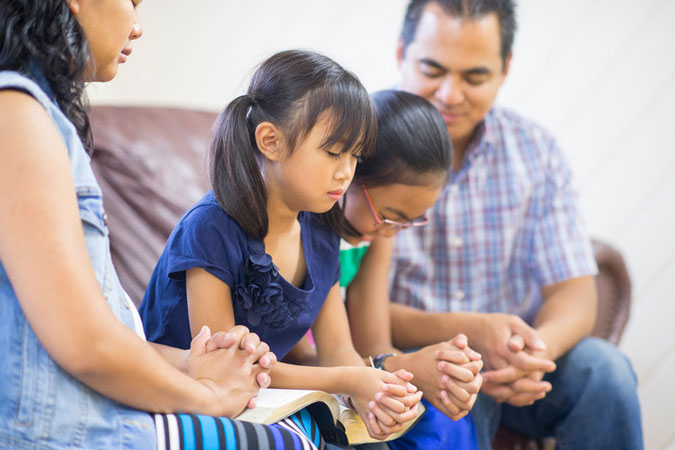
The following is excerpted from All God’s People: Effective Catechesis in a Diverse Church by Donna Toliver Grimes.
As a catechetical leader, you are called to form not just children but entire families. Moving forward, your task is to equip and empower families to once again embrace their role as the domestic church: a place where faith takes root and is nurtured. What approaches does the twenty-first-century catechetical leader need to take to make this a reality? Let’s look at a variety of strategies.
Flexibility
Because families are so busy and are pulled in so many different directions, it is more important than ever to provide options and flexibility when it comes to scheduling faith-formation sessions and opportunities. While it is not humanly possible to cater to every family’s individual needs and circumstances, it is important to offer options that show consideration for people’s busy schedules. This is especially important when it comes to sacramental preparation. Families today no longer march in lockstep—having their children baptized as infants, bringing them to First Communion in second grade and Confirmation in eighth grade. Children “out of sequence” is the new normal. You need to develop and sustain a catechumenal approach to the sacraments—one that involves the whole family. This should go without saying, but it is imperative that you not shame parents for bringing their children “out of sequence.” Rather, express understanding and welcome them, then enlist their full commitment in moving forward as a family to grow in faith.
Evangelization
Today, it is safe to assume that a large number of parents are themselves in need of evangelization and catechesis. Many parents nowadays do not feel confident about their capacity to guide their children’s spiritual development. They may not have had as much practice as their parents had. Perhaps they didn’t attend Mass regularly for many years or did not receive much explanation about the faith. More parents today are themselves children of divorce and blended families, for which weekly religious instruction was not a part of the family routine. Do all you can to welcome, invite, and engage parents in ways that were not needed a generation or two ago. Offer them every opportunity to grow in their own faith and to be evangelized through encounters with Christ.
“New” Methods
Many parishes are turning to faith-formation programs that can be described as “family catechesis.” This is an approach that combines monthly intergenerational gatherings (including time together as a family and an opportunity for adult faith formation while children attend a session with their catechist) with at-home sessions for children and their parents to work on together. In many ways, this approach is not new at all, since it simply calls upon parents to embrace their responsibility to teach their children in the faith. What is different is the time spent forming the adults and equipping/assisting them as they teach their own children.
Technology and Social Media
To foster better communication with families, it is imperative for you to use the latest technology and social-media formats, not only to share information about logistics, dates, and times but also as vehicles for faith formation per se. For example, you can utilize video meetings, using Skype or FaceTime on your computer or smartphone, to deliver brief inspirational/catechetical messages to parents. This will help them learn more about their own faith as they lead their children to a deeper faith. Likewise, because families are so busy and are pulled in many different directions, it’s important for you to be able to provide catechetical experiences digitally for those who cannot attend classes.
Listening
Part of your job as a catechetical leader is to actively and compassionately listen. As individuals, couples, or families share their stories (many of which will be very complex), you will get to know them so you can better serve them. Your role is not simply to administer a program but also to minister to people. While you are not a counselor or therapist, you are a pastoral minister who must seek to heal wounds and bring people closer to Christ. Often, that process begins simply by providing a listening ear. Therefore, it is imperative that you learn and practice pastoral presence, which is the ability to communicate authentic concern and care by focusing your undivided attention on the person(s) you are ministering to. Such active listening is referred to as “attending,” which involves positioning yourself physically so as to communicate full attention. In his book The Skilled Helper (Cengage Learning, 2013, 77–78), Gerard Egan offers the SOLER model.
- S = SQUARELY face the person.
- O = OPEN your posture by uncrossing your arms and legs.
- L = LEAN toward the person occasionally.
- E = Make EYE contact.
- R = RELAX your body and mind.
Remember to listen not only with your ears but with your eyes and your heart as well. In other words, observe people’s body language, facial expression, and tone of voice to pick up on cues that might reveal a story behind the story. Reflect back to others what you hear them saying in order to be sure you’re all on the same page. The key is to always be inviting those to whom you are ministering to recognize what God might be calling them to, as you help them to assess their situation, understand it, and act upon it.
—Excerpted from All God’s People: Effective Catechesis in a Diverse Church by Donna Toliver Grimes




Be the first to comment